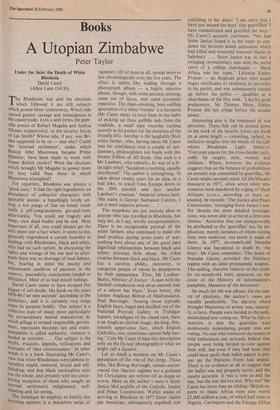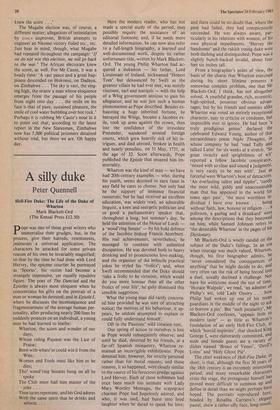Books
A Utopian Zimbabwe
Peter Taylor
Under the Skin: the Death of White Rhodesia David Caute (Allen Lane £14.95) The Rhodesian war and the elections which followed it are still subjects which arouse bitter controversy. Which side caused greater carnage and intimidation in the countryside, ZANLA and ZIPRA the guer- rilla armies of Robert Mugabe and Joshua Nkomo respectively), or the security forces of Ian Smith? Whose side, if any, was Bri- tain supposed to be on — and why? Could the 'internal settlement', under which Bishop Abel Muzorewa became Prime Minister, have been made to work with firmer British resolve? Were the elections which brought Mr Mugabe to power more (or less) valid than those in which Muzorewa triumphed?
For reporters, Rhodesia was always a good story.' It had the right ingredients: an abundance of colourful characters with quotable quotes; a beguilingly lovely set- ting; a few pangs of fear on lonely roads (with a self-congratulatory gin-and-tonic afterwards). You could see tragedy and Weep, view dead bodies and be sick. Most important of all, you could always get the next plane out: a fact which, it seems to me, generally engendered a certain humility in dealings with Rhodesians, black and white, who had no such option. In discussing the rights and wrongs of the war and its after- math there was no shortage of loud debate, but, bearing in mind the murky and unknowable cauldron of passions in the Country, journalistic conclusions tended to diffidence. Most of us had mixed feelings.
David Caute seems to have escaped this Plague of self-doubt. His book on the years 1976-80 ('an epic account' according to the Publishers, and it is certainly very long) states its purpose boldly: 'Our subject is a collective state of mind; more particularly the extraordinary mental manoeuvres by which pillage is termed responsible govern- ment, repression becomes law and order, usurpation is called authority, violence is lauded as restraint . . . Our subject is the Myths, evasions, legends, reifications and strategies of false consciousness.' In other Words it is a book illustrating Mr Caute's view that white Rhodesians were (almost in- variably) stupid, immoral, brutal and self- deluding; and that black nationalists were (on the whole, and certainly with the unsur- prising exception of those who sought an Internal settlement) enlightened, well- meaning and far-seeing.
The technique he employs to fortify this arresting opinion is a marathon series of vignettes: 167 of them in all, spread more or less chronologically over the five years. The effect is rather like wading through a photograph album — a highly selective album, though, with some pictures missing, some out of focus, and some extremely repetitive. The chain-smoking, beer-swilling ignoramus of a white troopie' is a favourite (Mr Caute seems to have been in the habit of picking up these gullible lads from the roadside, a small tape recorder turning secretly in his pocket for the duration of the friendly lift). Another is the laughably thick white farmer, who, having taken Mr Caute into his confidence over a couple of sun- downers, philosophises too freely with this former Fellow of All Souls. One such is a Mr Lambert, who remarks, by way of a lit- tle light relief: 'Socialism is nothing, equally distributed!' The author is unforgiving: 'It takes about twenty years for an idea, or a bad joke, to travel from Europe down to the 20th parallel and into rancher Lambert's cranium.' Imperial echoes here: 'My name is George Nathaniel Curzon, 1 am a most superior person . .
The snapshots are not entirely alien to anyone who has travelled in Rhodesia, but they are, as I say, wholly unrepresentative. There is no recognisable portrait of the white farmers who continued to make the land produce during seven years of war; nothing here about any of the good (and dignified) relationships between black and white; precious little about the tribal rivalries between black and black. Mr Caute has a carefree ability, moreover, to categorise people of whom he disapproves by their appearance. Thus, Mr Lardner- Burke, Minister of Justice: 'A man with the flushed complexion and silver-smooth hair of a saloon bar bigot.' Even better, the former Anglican Bishop of Mashonaland, Paul Burrough: 'Among those typically English faces, begot and distilled out of the National Portrait Gallery in Trafalgar Square, paradigms of the island race, there is an Anglican clerical visage, the long, thin, smooth upper-class face, which English Catholics, too, sometimes cannot help hav- ing.' Cute Mr Caute (I base this description only on the fly-leaf photograph) is what we might call a facialist.
Let us dwell a moment on Mr Caute's perception of the role of the clergy. Those who, like Bishop Burrough, remain uncon- vinced that Marxist regimes are a godsend for Christianity are written off as dupes or worse. More to the author's taste is Sister Janice McLaughlin of the Catholic Justice and Peace Commission. Within weeks of arriving in Rhodesia in 1977 Sister Janice (an American, subsequently expelled) was confiding to her diary: 'I am sorry that I have just missed the boys' (the guerrillas) '1 have romanticised and glorified the boys.' Mr Caute's account continues: 'Nor had Sister Janice found it in her heart to con- demn the terrorist bomb explosions which had killed and wounded innocent blacks in Salisbury . . . Sister Janice was in fact a swinging revolutionary nun with the awful verve of a college cheerleader — Black Africa was her team.' Likewise Father Prosser — an Anglican priest who issued bogus certificates of residence to terrorists in his parish, and was subsequently hauled up before the police — qualifies as a churchman of the first rank: 'Like his great predecessor, Sir Thomas More, Father Prosser did not cringe before the secular power.'
Interesting also is the treatment of war atrocities. Those that can be pinned down to the work of the security forces are dwelt on at some length — extending, indeed, to exclusive insights into the minds of the (all- white) Rhodesian Light Infantry: 'Everyone yearns for the cross-border raids, really fat targets, men, women and children.' Where, however, the evidence suggests that on the balance of probabilities an atrocity was committed by guerrillas, Mr Caute retains an open mind. Of the Musami massacre in 1977, when seven white mis- sionaries were murdered by a gang of black Africans (ZANLA, according to most ac- "counts), he records: 'The Justice and Peace Commission,' (swinging Sister Janice's out- fit) 'despite the most detailed investiga- tions, was never able to arrive at a firm con- clusion.' Atrocities that can unequivocally be attributed to the 'guerrillas' are, by im- plication, merely instances of whites tasting their own medicine: too much is made of them. In 1977, six-month-old Natasha Glenny was bayoneted to death by 'the boys'. Mr Caute comments: 'The death of Natasha Glenny provided the Salisbury regime with an ideal propaganda weapon. The smiling, cherubic features of this chub- by six-month-old baby appeared on the cover of the Ministry of Information's pamphlet, Massacre of the Innocents.'
So much for the war album. On the mat- ter of elections, the author's views are equally predictable. The election which brought Muzorewa to power was, natural- ly, a farce. People were herded to the polls, intimidated into voting etc. What he fails to mention is that the guerrillas were assiduously intimidating people into not voting. No-one who witnessed the scenes of wild enthusiasm can seriously believe that people were being herded to vote against their will, but even if they had been they could have spoilt their ballot papers in pro- test (as the Patriotic Front had urged). There is no evidence at all to suggest that the ballot was not properly secret, and the results accurate. It was a vote to end the war, but the war did not end. Why not? Mr Caute has more than an inkling: :British ex- ports to black Africa were now worth £2,000 million a year, of which half went to Nigeria. Carrington and the Foreign Office
knew the score . .
The Mugabe election was, of course, a different matter; allegations of intimidation by LAMA unproven, British attempts to engineer an Nkomo victory foiled etc., etc. Just bear in mind, though, what Mugabe had repeated throughout the campaign: `If we do not win this election, we will go back to the war.' The African electorate knew the score, as well. For Mr Caute, it was a heady time: 'A vast peace and a great hap- piness descended on Hokonui, on Dadaya, on Zimbabwe . . . The sky is vast, the sing- ing high, the orator a man whose eloquence emerges from the passage of his people from night into day . . . the smile on his face is that of pure, sustained pleasure, the smile of cool water bubbling over hot rock.' Perhaps it is rubbing Mr Caute's nose in it to point out that, according to the latest report in the New Statesman, Zimbabwe now has 5,000 political prisoners detained without trial, but there we are. Oh happy day.











































 Previous page
Previous page